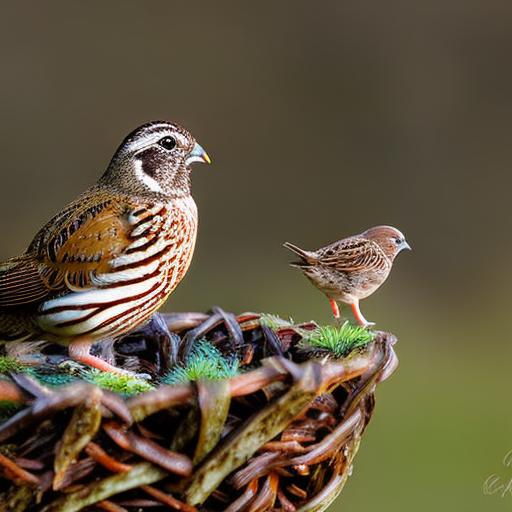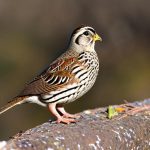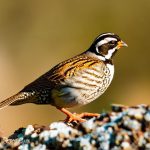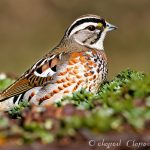Quails are small, ground-dwelling birds that have become increasingly popular as pets in recent years. They are known for their gentle nature, low maintenance requirements, and the delightful sound of their calls. Keeping quail as pets can be a rewarding experience for both novice and experienced bird enthusiasts. Quails are relatively easy to care for and can be kept in a variety of settings, making them a versatile pet option for many people.
Quails come in a variety of species, each with its own unique characteristics and requirements. From the colorful Coturnix quail to the elegant Bobwhite quail, there is a species of quail to suit every pet owner’s preferences. Before bringing quail into your home, it’s important to research the specific needs of the species you are interested in to ensure that you can provide them with a suitable environment and care. In this article, we will explore the various aspects of keeping quail as pets, including choosing the right species, housing and enclosure requirements, feeding and nutrition, health and wellness, behavior and socialization, and tips for keeping quail happy and healthy.
Key Takeaways
- Quail make great pets for those with limited space and time, as they are small, low-maintenance birds.
- When choosing a quail species, consider factors such as size, egg production, and temperament to find the best fit for your needs.
- Quail require a secure enclosure with proper ventilation, bedding, and nesting areas to thrive in captivity.
- A balanced diet of commercial quail feed, fresh greens, and occasional treats like mealworms is essential for the health of pet quail.
- Regular health checks, parasite prevention, and a clean living environment are crucial for maintaining the wellness of pet quail.
Choosing the Right Quail Species
When it comes to choosing the right quail species as a pet, there are several factors to consider. Different species of quail have different care requirements, so it’s important to choose a species that is well-suited to your lifestyle and living situation. Some popular quail species for pets include the Coturnix quail, Bobwhite quail, California quail, and Gambel’s quail.
Coturnix quail, also known as Japanese quail, are one of the most popular species kept as pets due to their small size, colorful plumage, and gentle disposition. They are also prolific layers, making them a popular choice for those interested in raising quail for eggs. Bobwhite quail are another popular choice for pet owners, known for their distinctive call and striking appearance. California quail are known for their sociable nature and striking plumage, making them a visually appealing choice for those looking to keep quail as pets. Gambel’s quail are native to the southwestern United States and are known for their distinctive topknots and vibrant coloring.
Before choosing a quail species as a pet, it’s important to research the specific care requirements of that species to ensure that you can provide them with the appropriate environment, diet, and socialization. Additionally, it’s important to consider local regulations and zoning laws regarding the keeping of quail as pets, as some species may be restricted in certain areas.
Housing and Enclosure Requirements
When it comes to housing and enclosure requirements for pet quail, there are several key factors to consider to ensure that your birds have a safe and comfortable living environment. Quails are ground-dwelling birds that require ample space to move around and exhibit natural behaviors such as dust bathing and foraging. When housing pet quail, it’s important to provide them with a secure enclosure that protects them from predators and the elements.
The size of the enclosure will depend on the number of quail you plan to keep. As a general rule of thumb, each quail should have at least 1 square foot of space in the enclosure to ensure that they have enough room to move around comfortably. The enclosure should also be equipped with appropriate bedding material, such as straw or wood shavings, to provide a comfortable surface for the quail to walk on and nest in.
In addition to space considerations, the enclosure should also include areas for food and water, as well as shelter from the elements. Quails are sensitive to extreme temperatures, so it’s important to provide them with access to shade during hot weather and protection from wind and rain during inclement weather. Additionally, the enclosure should be equipped with secure fencing or netting to prevent predators from gaining access to the birds. Overall, providing a spacious, secure enclosure is essential for ensuring the health and well-being of pet quail.
Feeding and Nutrition for Quail
Proper feeding and nutrition are essential for maintaining the health and well-being of pet quail. Quails are omnivorous birds that require a balanced diet consisting of protein, carbohydrates, vitamins, and minerals to thrive. When it comes to feeding pet quail, there are several options for providing them with a nutritious diet, including commercial quail feed, fresh fruits and vegetables, and supplemental protein sources.
Commercial quail feed is readily available at most pet stores and is formulated to meet the nutritional needs of quail. It typically contains a balanced blend of grains, seeds, and essential nutrients to support optimal health. When choosing a commercial feed for pet quail, it’s important to select a high-quality product that is specifically formulated for quail to ensure that they receive the necessary nutrients.
In addition to commercial feed, pet quail can also benefit from fresh fruits and vegetables as part of their diet. Leafy greens such as spinach, kale, and lettuce are excellent sources of vitamins and minerals for quail, while fruits such as berries, melons, and apples can provide additional nutrients and hydration. It’s important to introduce new foods gradually to prevent digestive upset and monitor your quail’s response to different foods to ensure that they are receiving a balanced diet.
Supplemental protein sources such as mealworms, crickets, and hard-boiled eggs can also be offered to pet quail to support their protein requirements. These protein sources can be offered as treats or mixed into their regular feed to provide additional nutrition. Overall, providing a varied diet consisting of commercial feed, fresh fruits and vegetables, and supplemental protein sources is essential for meeting the nutritional needs of pet quail.
Health and Wellness of Quail
Maintaining the health and wellness of pet quail is essential for ensuring that they lead happy and fulfilling lives. Like all animals, quails are susceptible to a variety of health issues that can impact their well-being if not properly addressed. It’s important for pet owners to be proactive in monitoring their quail’s health and providing appropriate care to prevent illness and injury.
One of the most important aspects of maintaining the health of pet quail is providing them with a clean living environment. Regularly cleaning the enclosure and providing fresh bedding material can help prevent the buildup of bacteria and parasites that can lead to illness. Additionally, providing access to clean water at all times is essential for preventing dehydration and supporting overall health.
Regular veterinary check-ups are also an important part of maintaining the health of pet quail. A qualified avian veterinarian can provide guidance on preventative care measures such as vaccinations and parasite control, as well as diagnose and treat any health issues that may arise. It’s important for pet owners to be vigilant in monitoring their quail for signs of illness or injury and seek veterinary care promptly if any concerns arise.
In addition to physical health, it’s important to consider the mental well-being of pet quail. Providing ample space for exercise and natural behaviors such as dust bathing and foraging can help prevent boredom and reduce stress in pet quail. Additionally, providing opportunities for socialization with other quail can help prevent loneliness and promote overall well-being. Overall, maintaining the health and wellness of pet quail requires a proactive approach to preventative care and prompt attention to any health concerns that may arise.
Quail Behavior and Socialization
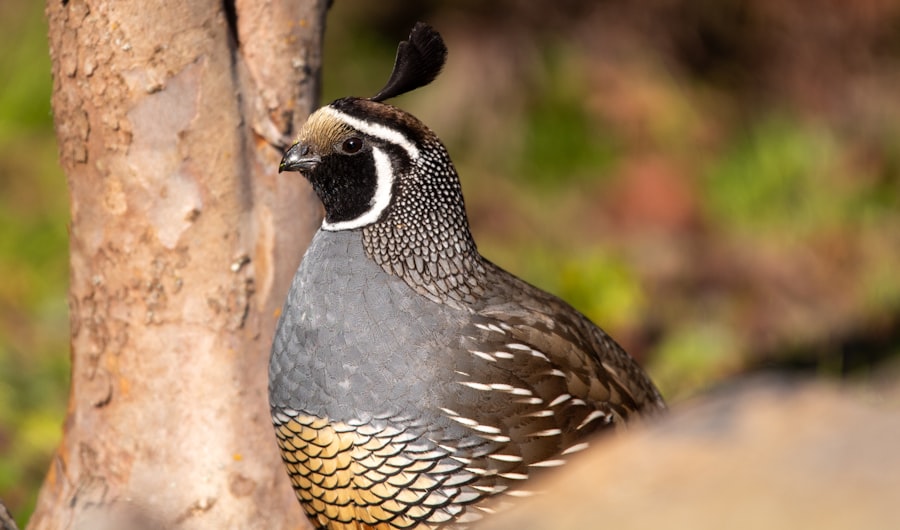
Quails are social birds that thrive in the company of their own kind. In the wild, they form tight-knit flocks and engage in social behaviors such as grooming each other and communicating through vocalizations. When kept as pets, it’s important to provide pet quail with opportunities for socialization to support their natural behaviors and overall well-being.
One of the most important aspects of socialization for pet quail is providing them with appropriate companionship. Quails are highly social birds that benefit from living in groups, so it’s important to keep at least two or more quail together to prevent loneliness and promote social interaction. When introducing new quail to an existing group, it’s important to monitor their interactions closely to ensure that they get along well and do not exhibit aggressive behaviors towards each other.
In addition to living with other quail, pet quail can also benefit from social interaction with their human caregivers. Spending time near the enclosure talking softly or offering treats can help acclimate pet quail to human presence and promote trust between the birds and their owners. It’s important to approach pet quail calmly and avoid sudden movements or loud noises to prevent stress or fear responses.
Providing ample space for exercise and natural behaviors is also important for promoting socialization among pet quail. A spacious enclosure equipped with areas for dust bathing, foraging, and perching can provide opportunities for social interaction among the birds while supporting their natural behaviors. Overall, promoting socialization among pet quail through appropriate companionship, interaction with human caregivers, and opportunities for natural behaviors is essential for supporting their overall well-being.
Tips for Keeping Quail Happy and Healthy
Keeping pet quail happy and healthy requires attention to their physical, mental, and social needs. In addition to providing a nutritious diet, clean living environment, and opportunities for socialization, there are several additional tips for keeping pet quail happy and healthy.
Providing ample space in the enclosure is essential for promoting physical activity and natural behaviors among pet quail. A spacious enclosure equipped with areas for dust bathing, perching, and foraging can help prevent boredom and support overall well-being.
Offering environmental enrichment such as toys or natural materials can also help keep pet quail mentally stimulated and prevent boredom. Simple items such as branches or hanging mirrors can provide opportunities for exploration and mental engagement.
Monitoring your quail’s behavior closely can help you identify any signs of stress or illness early on. Changes in behavior such as decreased activity or appetite can be indicators of underlying health issues that require attention from a veterinarian.
Regularly interacting with your pet quail can help build trust between the birds and their human caregivers. Spending time near the enclosure talking softly or offering treats can help acclimate pet quail to human presence and promote positive associations with their owners.
Overall, keeping pet quail happy and healthy requires attention to their physical, mental, and social needs through providing a nutritious diet, clean living environment, opportunities for socialization, ample space in the enclosure, environmental enrichment, monitoring behavior closely, and regular interaction with human caregivers.
In conclusion, keeping quail as pets can be a rewarding experience that offers opportunities for companionship with these charming birds. By choosing the right species, providing appropriate housing and nutrition, maintaining their health and wellness, understanding their behavior and socialization needs, and implementing tips for keeping them happy and healthy, pet owners can create a fulfilling environment for their feathered friends. With proper care and attention, pet quail can thrive in captivity while bringing joy and delight to their human companions.
If you’re considering keeping quail as pets, you may be interested in learning about what vegetables quails eat. Poultry Wizard has a helpful article on this topic, which provides valuable insights into the dietary needs of quails. You can find more information on this subject by visiting Poultry Wizard’s article on what vegetables do quails eat. Understanding the nutritional requirements of quails is essential for their well-being and can contribute to a fulfilling experience as a quail owner.
FAQs
What are quail?
Quail are small ground-dwelling birds that belong to the family Phasianidae. They are known for their distinctive calls and are often found in a variety of habitats, including grasslands, woodlands, and agricultural areas.
Can quail be kept as pets?
Yes, quail can be kept as pets. They are relatively low-maintenance and can be a great addition to a backyard or small farm.
What do quail eat?
Quail are omnivorous and their diet consists of a variety of foods including seeds, insects, and small plants. They can be fed a commercial game bird feed or a mixture of grains and seeds.
What kind of housing do quail need?
Quail require a secure and predator-proof enclosure that provides them with enough space to move around and access to fresh water and food. They also need a sheltered area to protect them from extreme weather conditions.
How do you care for pet quail?
Caring for pet quail involves providing them with a balanced diet, clean water, and a suitable living environment. Regular cleaning of their enclosure and monitoring their health is also important.
Are quail social animals?
Quail are social birds and are best kept in small groups. They thrive in the company of their own kind and can become stressed if kept alone.
Do quail require any special veterinary care?
Quail generally do not require special veterinary care if they are kept in a clean and healthy environment. However, it is important to monitor their health and seek veterinary attention if any issues arise.
Can quail be kept with other pets?
Quail can be kept with other pets, but it is important to ensure that they are not housed with animals that may pose a threat to them. Additionally, their living environment should be suitable for all the animals in the same space.
Meet Walter, the feathered-friend fanatic of Florida! Nestled in the sunshine state, Walter struts through life with his feathered companions, clucking his way to happiness. With a coop that’s fancier than a five-star hotel, he’s the Don Juan of the chicken world. When he’s not teaching his hens to do the cha-cha, you’ll find him in a heated debate with his prized rooster, Sir Clucks-a-Lot. Walter’s poultry passion is no yolk; he’s the sunny-side-up guy you never knew you needed in your flock of friends!

